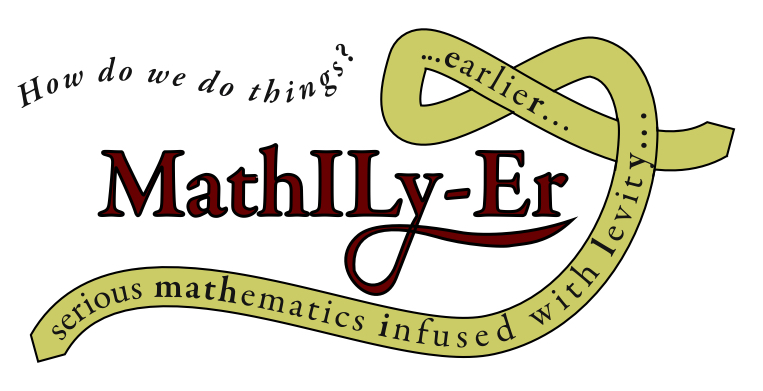My teaching practices are centered on active and inquiry-based learning. During the academic year, I teach in the School of Mathematics at Georgia Tech. Below are descriptions and materials for some of the courses that I ran.
During the summer, I direct and teach at MathILy-Er, an intensive summer program for high school students.
Courses at Georgia Tech
| S26 | 4032 Combinatorial Analysis |
| F25 | 1553 Linear Algebra |
| F24 | 4221 Stochastic Processes I |
| S24 | 4032 Combinatorial Analysis |
| F23 | 1711 Finite Mathematics |
Courses at Rutgers
| F21, S21 | 123 Prep for Calculus |
| F20 | 351 Abstract Algebra (TA) |
| Su20 | 454 Combinatorics |
| F19, S19 | 251 Linear Algebra (TA) |
| F18, F17 | 152 Calculus II (TA) |
| S18 | 151 Calculus I (TA) |
MathILy-Er
At MathILy-Er we teach undergraduate-to-graduate-level mathematics in an inquiry-based environment. The core curriculum is discrete mathematics accompanied by binary linear algebra, number theory, and disease modeling, to name a few topics, with a strong focus on proof-writing. I often teach mini courses on extremal combinatorics, combinatorial designs, or surreal numbers. I also teach an intensive course on probabilistic combinatorics.
Click the link to learn more.

Spring 2026: Math 4032 Combinatorial Analysis
This is an advanced combinatorics course for math and computer science majors; in particular, it has a first course in combinatorics as a prerequisite. The course is run in a primarily inquiry-based format, so classes consist of groupwork and student-driven class discussions. The topics covered will be roughly the same as Spring 2024 Math 4032 (described below) but the assessment structure will be more like that of Fall 2024 Math 4221 (also below). Topics may include:
- enumeration (brief review via counting functions, Catalan numbers, bijective and combinatorial proofs)
- probabilistic combinatorics (probabilistic method of proof, linearity of expectation, alterations, random graphs, thresholds)
- extremal combinatorics (Ramsey theory, extremal graph theory, chains and antichains in posets)
- linear algebraic methods (oddtown, distance sets, basic polynomial method)
Materials related to the course:
Fall 2024: Math 4221 Stochastic Processes I
This course serves as an introduction to discrete-time Markov chains. Similarly to Math 4032 (see below), the course was run in a primarily inquiry-based format, so classes consisted of groupwork, presentations, and student-driven class discussion. A first course in probability is a prerequisite.
The topics were roughly as follows:
- Probability foundations (probability spaces, sets, random variables, expectation, conditional expectation)
- Probability and moment generating functions
- Simple random walk and branching processes
- Laws of Large Numbers, Central Limit Theorems, convergence of random variables
- Markov chains (limit theorems for absorbing and regular/ergodic Markov chains, stationary distributions, coupling, mixing time)
- Martingales
Materials related to the course:
Spring 2024: Math 4032 Combinatorial Analysis
This course was an advanced combinatorics course for math and computer science majors; in particular, it had a first course in combinatorics as a prerequisite. I ran the course in a primarily inquiry-based format, so classes consisted of groupwork, presentations, and student-driven class discussions. In addition to combinatorial methods and thinking, there was an emphasis on mathematical communication, both written and oral. Topics included:
- enumeration (set and integer partitions, counting functions, binomials, bijective and combinatorial proofs, generating functions)
- probabilistic methods and random graphs
- extremal combinatorics (Ramsey theory, extremal graph theory, chains and antichains in posets)
- linear algebraic methods
This course took inspiration from my previous Math 454 course as well as courses at MathILy/MathILy-Er but was distinct from both: compared to the former, Math 4032 covered more advanced material. The primary form of assessment was in problem sets, three individual writing/research projects, and a final presentation. Some materials related to the course:
- Syllabus
- Guidelines for Project 1: OEIS
- Guidelines for Project 2: Probabilistic Combinatorics
- Guidelines for Project 3: Extremal Combinatorics
- End-of-course student evaluations (CIOS)
Summer 2020: Math 454 Combinatorics
This course was an introduction to combinatorics class taught at Rutgers University. While the course involved many proofs, it did not have the Introduction to Proofs course as a prerequisite. The course took place over six weeks in the summer, and met four days a week for two hours each day. It was also held entirely over Zoom. As there was no standard syllabus for this course, I was free to restructure it entirely as an IBL course and utilized Google Doc worksheets and breakout rooms.
Here are some materials related to the course:
- Syllabus
- Worksheet 5 on the Twelvefold Way (blank, filled-out)
- Worksheet 9 on arithmetic and geometric sequences (blank, filled-out)
- Worksheet 11 introducing generating functions (blank, filled-out)
- Worksheet 17 on Latin squares (blank, filled-out)
I created a total of 21 worksheets (one for each instructional day of the course). They have subsequently been used (to varying extents) in four other courses, both at and outside of Rutgers, both online and in-person. If you are interested in using them as a resource, please get in touch with me.